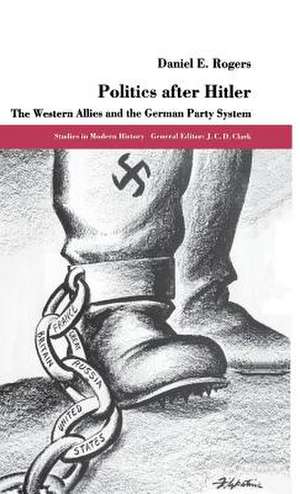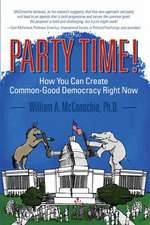Politics after Hitler: The Western Allies and the German Party System: Studies in Modern History
Autor D. Rogersen Limba Engleză Hardback – 8 feb 1995
| Toate formatele și edițiile | Preț | Express |
|---|---|---|
| Paperback (1) | 373.94 lei 6-8 săpt. | |
| Palgrave Macmillan UK – 8 feb 1995 | 373.94 lei 6-8 săpt. | |
| Hardback (2) | 380.92 lei 6-8 săpt. | |
| Palgrave Macmillan UK – 8 feb 1995 | 380.92 lei 6-8 săpt. | |
| NEW YORK UNIVERSITY PRESS – 28 feb 1995 | 512.48 lei 6-8 săpt. |
Din seria Studies in Modern History
-
 Preț: 390.36 lei
Preț: 390.36 lei - 15%
 Preț: 627.29 lei
Preț: 627.29 lei - 15%
 Preț: 635.13 lei
Preț: 635.13 lei - 15%
 Preț: 630.01 lei
Preț: 630.01 lei -
 Preț: 382.79 lei
Preț: 382.79 lei - 18%
 Preț: 935.73 lei
Preț: 935.73 lei -
 Preț: 385.61 lei
Preț: 385.61 lei - 15%
 Preț: 631.14 lei
Preț: 631.14 lei -
 Preț: 381.87 lei
Preț: 381.87 lei -
 Preț: 382.79 lei
Preț: 382.79 lei -
 Preț: 379.04 lei
Preț: 379.04 lei -
 Preț: 382.79 lei
Preț: 382.79 lei - 18%
 Preț: 929.69 lei
Preț: 929.69 lei - 15%
 Preț: 635.13 lei
Preț: 635.13 lei -
 Preț: 409.66 lei
Preț: 409.66 lei -
 Preț: 374.51 lei
Preț: 374.51 lei - 18%
 Preț: 985.23 lei
Preț: 985.23 lei - 15%
 Preț: 631.77 lei
Preț: 631.77 lei - 18%
 Preț: 720.02 lei
Preț: 720.02 lei - 15%
 Preț: 629.38 lei
Preț: 629.38 lei - 15%
 Preț: 633.23 lei
Preț: 633.23 lei -
 Preț: 379.04 lei
Preț: 379.04 lei -
 Preț: 382.79 lei
Preț: 382.79 lei -
 Preț: 335.87 lei
Preț: 335.87 lei -
 Preț: 387.52 lei
Preț: 387.52 lei - 18%
 Preț: 926.63 lei
Preț: 926.63 lei -
 Preț: 415.18 lei
Preț: 415.18 lei -
 Preț: 383.74 lei
Preț: 383.74 lei - 15%
 Preț: 629.70 lei
Preț: 629.70 lei - 15%
 Preț: 628.41 lei
Preț: 628.41 lei - 38%
 Preț: 438.24 lei
Preț: 438.24 lei -
 Preț: 385.25 lei
Preț: 385.25 lei - 15%
 Preț: 628.74 lei
Preț: 628.74 lei -
 Preț: 381.87 lei
Preț: 381.87 lei -
 Preț: 379.42 lei
Preț: 379.42 lei - 18%
 Preț: 711.34 lei
Preț: 711.34 lei - 15%
 Preț: 630.15 lei
Preț: 630.15 lei - 15%
 Preț: 632.73 lei
Preț: 632.73 lei -
 Preț: 376.97 lei
Preț: 376.97 lei - 15%
 Preț: 627.75 lei
Preț: 627.75 lei - 15%
 Preț: 637.04 lei
Preț: 637.04 lei -
 Preț: 378.08 lei
Preț: 378.08 lei
Preț: 380.92 lei
Nou
Puncte Express: 571
Preț estimativ în valută:
72.90€ • 75.72$ • 60.55£
72.90€ • 75.72$ • 60.55£
Carte tipărită la comandă
Livrare economică 03-17 februarie 25
Preluare comenzi: 021 569.72.76
Specificații
ISBN-13: 9780333628157
ISBN-10: 0333628152
Pagini: 224
Ilustrații: XIV, 206 p.
Dimensiuni: 140 x 216 x 20 mm
Greutate: 0.43 kg
Ediția:1995
Editura: Palgrave Macmillan UK
Colecția Palgrave Macmillan
Seria Studies in Modern History
Locul publicării:London, United Kingdom
ISBN-10: 0333628152
Pagini: 224
Ilustrații: XIV, 206 p.
Dimensiuni: 140 x 216 x 20 mm
Greutate: 0.43 kg
Ediția:1995
Editura: Palgrave Macmillan UK
Colecția Palgrave Macmillan
Seria Studies in Modern History
Locul publicării:London, United Kingdom
Cuprins
Preface - Abbreviations - Allied Occupation and German Political Party Tradition: Preconditions for a Revival - Crafting a Party System: The Return of German Party Politics and the Beginning of Licensing Regimes - In Fear of Reaction: Restraining the Rise of a Far Right - In Fear of Revolution: Confronting the Communist Parties - In Fear of a Greater Germany - In Fear of Fragmenting Stability: Limiting the Splinter Parties - Conclusion - Notes - Bibliography - Index
Notă biografică
DANIEL E. ROGERS
Textul de pe ultima copertă
Politics after Hitler is the first book to demonstrate the importance of America, Britain, and France in the development of party politics in Germany after 1945. In the wake of the war, rightists of all descriptions, Communists, nationalists, and founders of small splinter parties all came under intense and deliberate pressure from the Western occupying forces. The occupiers arrived in Germany in 1945 without firm plans for reviving German politics and were forced to improvize by hastily constructing a licensing system for new parties. The Allies then used their licensing powers to limit and steer party politics in desirable directions, disempowering reactionary and hypernationalist forces, diluting fears of a Communist revolution, and preventing the political fragmentation that led to the collapse of the Weimar Republic a generation earlier. Based on extensive archival research, Politics after Hitler concludes that interference by the occupying forces made a stable and moderate party system in the FRG much more likely than has previously been assumed. The Allied occupation of Germany was therefore a resounding success in helping move the German political system toward the stability it enjoys to the present day.
















